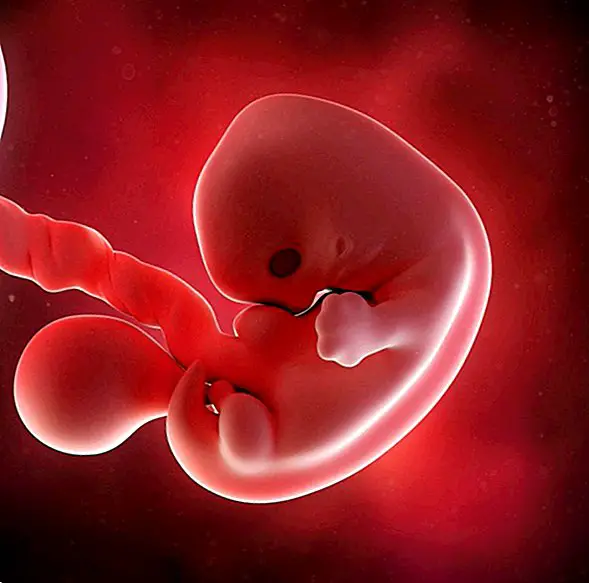Week 7 of pregnancy
Seventh week of pregnancy. The most important:
You are in the seventh week of pregnancy. During this week the embryo will begin to form its face, its eyes will already have color, and the beat of its heart will be more regular.
Week 7 of pregnancy (Week 5 of pregnancy).
If you feel morning nausea, dizziness and even vomiting are absolutely normal symptoms - and common - during the first weeks of pregnancy. You can soothe them with a little ginger, or an infusion and a piece of cake before getting up in the morning.
Folic acid supplements and other vitamins continue to be very important during this week. Do not forget to keep taking them.
If you have not had it yet, it is possible that this week you already have the first consultation with your gynecologist, especially if you go for private. If you do it for public health, and you have gone to your GP, it is likely that I have already referred you to your midwife, and have the first consultation with her.
Every week from approximately the fourth to fifth week in which the embryo is implanted in the endometrium, the future baby grows and develops in a dizzying way, so accelerated that it even comes as a surprise.
In this seventh week the embryo can reach 1.2 centimeters (12 millimeters), although it can reach 1.5 centimeters by the end of this week (15 millimeters). And if we compare it with a food to give you an idea, it is more or less the size of an olive bone, or that of a cranberry.
It is quite likely that, during this week, your first symptoms of pregnancy they become somewhat more intense, although it is possible that even today you do not feel very much. It is absolutely normal, and does not mean that the pregnancy goes badly. On the contrary, each body is a world and even each pregnancy is different, so you will not always feel the same symptoms or signs.

The development of the baby during the seventh week of pregnancy
As we mentioned briefly at the beginning of this note, this week the future baby will have about 12 millimeters. Although by the end of the week it can reach 15 millimeters. If we consider that last week had about 6 millimeters, we found that its growth is just a few days surprising.
His gestational age is actually 5 weeks, and in these days he continues with the development of all his organs and diverse systems of the body.
For example, they begin to form their facial features (the face), which tend to be much more evident. The nose begins to appear, the eyelids and a small hole that will shape the mouth. In addition, the eyes already have color.
Your little heart begins to beat more regularly, and both the liver and the bronchi and pancreas begin to form and function. Since the bone marrow has not yet been formed, the little liver will be in charge of making the different blood cells in these first weeks.
The skin is still very thin, almost practically transparent, and both his arms and legs are still small bumps without a well-defined shape. However, his legs begin to grow.
In addition, your small kidneys are also trained and practically ready to start managing waste, with the production and excretion of urine.

What changes and symptoms occur in the future mother during week 7 of pregnancy?
Since you are probably aware that you are pregnant at this time, it is also possible that you may have felt some of the typically early symptoms of pregnancy, which tend to arise from the first weeks. Especially if, maybe, you are somewhat more aware of them.
The morning sickness they are undoubtedly the most common, since it is estimated that around two out of three women tend to suffer them, especially in the mornings. It is a tremendously common symptom, although it is usual does not mean that you also have to suffer them. Of course, in case you have them, the ginger It tends to help at the time of calming them, as well as chewing a couple of almonds or having an infusion along with an integral bread cake.
You may also feel other symptoms that are just as common, such as:
- Vomiting, especially if you feel nauseous.
- Burning in the stomach
- Headache.
- Tiredness and sleepiness
- Frequent desire to go to the bathroom to urinate.
- Constipation.
- Sudden mood swings, nervousness and irritability.
The control of pregnancy from the seventh week of pregnancy
As we told you in week 6 of pregnancy, it is likely that both last week and this one you went to your gynecologist's office to tell her that you are pregnant, and to begin properly with the pregnancy control. If this is not the case, we encourage you to do so since it is very important to start with the pregnancy control and with the prenatal control itself, to make sure that everything is fine and that no problem or complication has occurred.

If so, during the first consultation the gynecologist will ask you a series of questions such as what was your last period, whether it is the first pregnancy or not, as well as whether or not there are certain family or family history of some diseases, disorders or allergies .
It is also likely that you will be referred to the midwife's office, especially if you will continue your pregnancy in Social Security through public health. If so, it is more than likely that the person who referred you to the midwife's office is your general practitioner, since in reality the first consultation with the gynecologist or obstetrician will not be until around the 12th week of pregnancy.
In any case, it will take the first steps and begin to keep track of your pregnancy:
- Weight control:It will indicate what your current weight is, to have a control of how much weight you will increase in the next months. The usual thing is to climb around 10-12 kg. throughout the pregnancy, it is not advisable to exceed 1.5 kg. per month.
- Control of blood pressure:This control is essential to control you, especially if you have high or low blood pressure, since -for example- high blood pressure is a risk of complications during pregnancy, as it can cause pre-eclampsia and premature birth.
- Blood and urine tests:It will lead you to complete a thorough analysis of both blood and urine. In addition, blood tests will include serological parameters to find out if there are antibodies from viruses such as hepatitis or HIV, rubella or toxoplasmosis.



